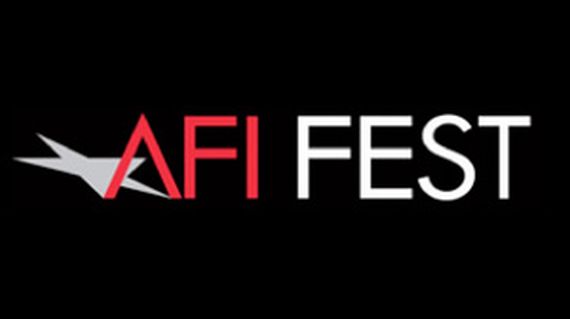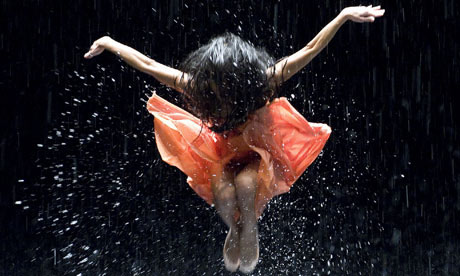AFI Fest, Day 4
Today was a day I shall long remember. As one of the artistic directors (whose name I did not record) admitted as he introduced today’s 12:30 screening, there are few giants of cinema left, but Bela Tarr must certainly be counted among them. To get to see a new work of his projected on a screen of substantial size with a respectful audience is gift enough – getting to hear the man speak about his art is quite another. I had heard rumblings on Twitter that due to a last-minute cancellation elsewhere, Tarr would be making an appearance at AFI Fest, but I refused to believe it until this afternoon, when he was called to the front of the auditorium to introduce his new film, The Turin Horse.
He did not say much by way of introduction, but warily suspected that not everybody might know his game. He hoped we’d enjoy the film, but noted, “It’s long…slow…black and white…miserable…boring.” He then reminded us that in spite of all this, the sun is still shining. Fair enough, Bela Tarr, fair enough. I would certainly agree with all those descriptions, save the bit about the boring, as I’m not posturing when I say I was riveted through every second of the film’s 146 minutes. Beyond his graceful camera movements and expert compositions, there’s an economy to his storytelling necessitated by his style (30 shots over 146 minutes leaves not a lot of time to explore various locations or points in time) that is stunning to look back on and consider how much is conveyed through so very little. It’s a grueling experience, but nearly a story of Biblical proportions, and perhaps the best film I’ve seen yet at the festival.
I will write more about the film later when I’ve further digested it, but I do want to share what Tarr had to say in the question-and-answer session afterwards, as, this being his final film, there will be precious few opportunities left. On that topic, Tarr simply stated that he’s benefited greatly from working in the field for thirty-four years, during which time he’s pretty much been allowed to make the films he wanted to, the natural result of which has left him with nothing further to express through the medium. He did not wish to share his future plans. “Do you think I have to die?” he asked the moderator.
He was asked about his frequent use of animals (the titular horse is an amazing presence in the film, bold and stoic and seemingly afraid). “Films rarely account for animals,” he said. “If you want to say something about the world, you have to include animals. Whether we are a part of their world or they a part of ours,” they are important. Similarly, he said that in exploring life, one must also account for time, and that his films’ pace is born out of that desire: “We are losing time, day by day, life getting shorter. If you want to talk about life, you also have to talk about the time, which is not always too fast, but sometimes too slow.”
The film has very little dialogue, but there is an extended, wrenching monologue in which the farmer’s neighbor regrets humanity’s continuous process of rebuilding and tearing down the good in society. “I don’t know what is the good and what is the bad,” Tarr said. “I never judge the people. I have to be very tender. Respectful. I’m one of them. I show them to you with all my pain.”
He praised the crew he ended up with, which mostly consisted of neighboring farmers, noting that they worked the wind machines better than the professional film crew (to say that wind plays a role in this picture is an understatement). He also hired a crew of elderly builders to build the house around which the film’s action takes place, finding that they remembered what a real building was, not – and I’m quoting directly here – “this plastic shit.” Huge laugh from the audience.
It was a tremendous afternoon. All in all I was in that one theater for over three hours straight, and never less than enchanted during every second. Tarr was a surprisingly engaging speaker, even while having exactly the attitude and cadence you’d kind of want him to have. The film was undeniably a punishing experience, but one I found monumentally enriching, about which I will certainly be writing more later. For now, bear in mind that it will play again on Wednesday at 1:00. If you can’t catch it then, Cinema Guild is releasing it, and it has a scheduled playdate on Laemmle’s website for March of next year here in Los Angeles. It’s not an easy proposition distributing or exhibiting such a film, so I strongly urge you to go and support the art.
After that, I went across the hall to see Wim Wenders’ Pina. As I may have mentioned a few times by now, I’m a big fan of 3D filmmaking, and have been awaiting this year – which has included or will include 3D films from Werner Herzog, Martin Scorsese, and Steven Spielberg – with tremendous anticipation, and Wenders’ film gives even more credence to the ideal that the artist dictates the art, not the medium. Pina would be an extraordinary film in any dimension (especially the fifth! [I don’t know what that means]), but his use of 3D space is so natural and intuitive to his subject, a tribute to one of the great artists of modern dance, Pina Bausch. The film provides little insight into her life or process, as it should be. The proof is in the pudding – the pieces presented are immediately involving and breathtaking. Wenders also allows for more interpretive segments, asking Pina’s dancers questions and having them respond with interpretive dance on location in Europe (note: this was note immediately clear in the film, which would have been nice, but Wender’s noted it in the Q&A following). It’s a joyous piece, free of cynicism or negativity but so pure in its purpose it easily swept the audience away. It’s also the best use of live-action 3D I’ve yet seen, by far.
I then stepped out of the theater and right back into line to re-enter the same theater for Ralph Fiennes’ directorial debut, Coriolanus. After enduring them nearly quarterly in college, I am almost categorically opposed to Shakespeare adaptations that retain the text, but transplant the action to a modern setting*. I find it cheap and vulgar, an easy way to make the work seem more “relatable” and “fresh,” though they are always the least interested in truly diving into Shakespeare’s intent and meaning. Coriolanus takes that method, and although I don’t see any clear benefit in its modern setting, it is by far the most successful attempt I’ve yet seen. Fiennes’ actors clearly know their text, and while he casting himself in the title role might be a bit of an ego stroke, he’s also perfectly suited to a Shakespeare lead, with his crazy eyes and slightly detached vocal pattern. While it certainly requires some massive leaps of logic to convince yourself this could happen in any artistic interpretation of the modern era, the commitment of the cast (which includes Brian Cox, Vanessa Redgrave, Jessica Chastain, and Gerard Butler) lends it a credence it should not reasonably have.
I get Fiennes’ point, that Shakespeare’s warnings of the political process – in which the public is swayed this way and that with neither side holding to heart their best interests (one has a candidate who sees himself above the need for the public’s approval, the other simply wants to defeat him at any cost) – are as vital today as when he wrote them, but any thinking person would be able to draw that from a straight adaptation of the text. It’s hard to totally dislike the film, as it is pretty masterfully achieved for what it is (though even this fan of shaky-cam wondered if maybe the cam was too shaky here and there), the story itself is so wonderful, and Shakespeare’s language is always a joy to hear spoken by such accomplished actors, but I do think it’s a little misguided in its futile attempts to be “timely.”
Tomorrow’s going to be an insane day, as I have a press screening in the morning before the festival goes up for another day, and I’m pretty intent on staying on Hollywood Blvd. well after midnight. My dwindling sanity can be tracked on Twitter @railoftomorrow.
*I exempt from this Julie Taymor’s Titus, which includes modern elements but has no setting in terms of time (nor much of one in terms of place, either).






























